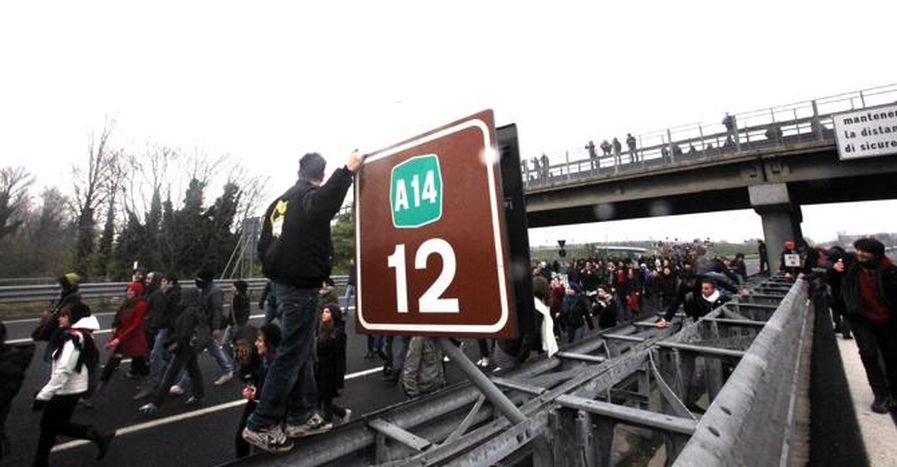
Why are students protesting in Bologna
Published on
Translation by:
 blackbird3
blackbird3
With cries of 'block everything!', Italian students have been demonstrating for days against the university reforms currently being discussed in parliament. This report is from Bologna, where heated protests have even made headlines in the New York Times
On 30 November around 7, 000 young people marched through the city of Bologna before heading for the motorway toll to block the lanes. For around two hours traffic was at a standstill, effectively cutting Italy in two. 'In order to catch everyone’s attention we had to take dramatic action; there is a blanket of fog in this country which prevents social needs being heard,' says Simone, one of the movement’s coordinators. On the same day the demonstrators tried to break into the train station; train lines have been obstructed in many Italian cities where students have been protesting. However demonstrators were prevented from reaching the platforms by a reinforced line of riot police, who used their batons freely, and charged on several occasions. 'The fact that the police are preventing us from putting our plans into action is a violation of our right to strike, a right which we as an unrecognised group in a precarious situation are being denied,' adds Antonio.
There were also clashes on the following day at the Bologna exhibition centre. It was the opening day of the motor show, which is the largest national event of its kind. 'We demonstrated there because we think of it as a symbolic representation of consumerism, exactly the kind of society we want to fight against,' says Jessica earnestly. 'We want to fight it with knowledge and awareness, and therefore from university: the basic institution that educates thinkers and a place free from consumer logic.'
At 7pm on 2 December I go to the literature and philosophy department of the university of Bologna. Every evening the students gather in the hreat hall to discuss the day of demonstrations and organise new action. Anyone who wishes to speak can sign up to the debate and take their turn at the microphone. The recent clash with the police has added extra spark to the speeches; many of those present experienced violence and there is no shortage of plasters and bruises on heads and faces. Some talk about how the riot police are an enemy to fight against, but many more focus on the issue at stake: expressing opposition to the university reforms. 'We must remember that when we demonstrate, we don’t just represent ourselves as individuals, but the whole movement,' explains Chiara. 'This means we need a strong sense of personal responsibility.'
Around three hundred people are participating in what is referred to as a 'constituent assembly'. They enthusiastically approve the proposal to set up a student-only think tank to come up with concrete ideas for reforming both the education system itself and learning methods at university. 'What we don’t like about this reform is the way in which funding for research and learning is being drastically cut,' says Simone. 'There is also an issue surrounding researcher autonomy: they have to go along with the courses imposed by their supervising professor, who wields an almost unlimited amount of power when it comes to doctoral candidates and their career advancement.'
The development of real proposals represents a vital part of the student movement. To this end Antonio has noted the need to involve other sectors of society in order to fight what he sees as a common battle. 'The university cuts mean devaluing the qualifications of those entering the world of work. So the theme of precarious or unstable jobs is closely linked to our debate. We need to understand how the consequences of these policies go to the heart of not only student rights, but the rights of workers too.' Simone underlines this point: 'Our struggle is not limited to university reform, but also touches other government policy areas such as financial law, for example. We are also looking to push for a general strike, one that will involve all other groups of workers who are not only suffering from a precarious working situation but are also experiencing attacks on their hard-won rights.'
In spite of the crisis spreading through Italian society, there is hope within the student movement. The final vote on the reform has been postponed for two weeks, which is being hailed as a great victory by the students; they are preparing further demonstrations with a view to attending a national event in Rome timed to coincide with the parliamentary confidence vote. 'We don’t feel alone,' says Simone. 'We feel a great sense of solidarity, as shown by the encouragements from the lorry drivers sounding their horns while trapped on the motorway. Every day we are in the newspapers, every day we are out on the streets to draw the public’s attention to our cause. We too have played a part in the current governmental crisis.' When asked how it will end the faces of the group light up with smiles and they answer daringly: 'We will win!'
Translated from Studenti in rivolta a Bologna: «Vinceremo!»


